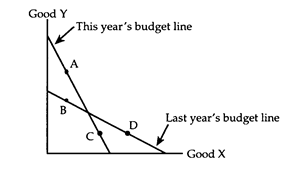Economic growth comes from ________
A) people willing to increase their skills in which case, economic growth is free
B) producing more goods than people want to consume
C) capital accumulation and the avoidance of opportunity cost
D) capital accumulation and technological advance
D
You might also like to view...
The opportunity cost of an activity means the:
a. amount of money the activity costs. b. number of hours that is required to engage in this activity. c. expected gains by engaging in the activity. d. amount of other things that must be sacrificed in order to engage in the activity. e. expected gains minus the expected costs of engaging in the activity.
Refer to Budget Lines. If the consumer purchased basket B last year and purchases basket C this year, we can conclude that

a. the consumer is not behaving optimally.
b. the consumer's tastes changed between this year and last year.
c. the consumer's indifference curves cannot be convex.
d. the law of demand does not hold for this consumer.